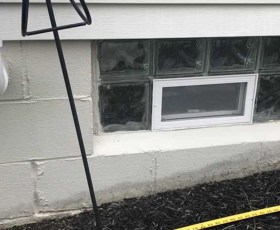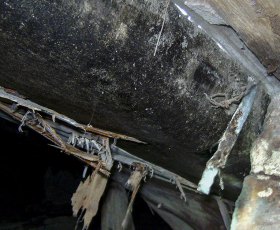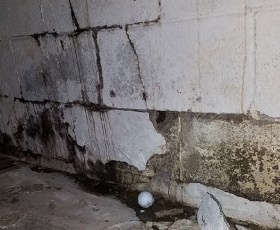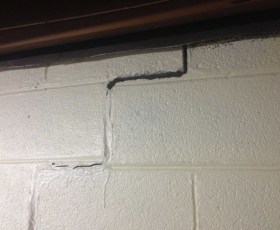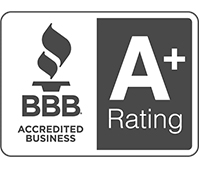
Greenville
A home cannot be healthy without a dry foundation. With the use of sump pumps and interior drainage, your home's structural integrity will be secured.
Schedule Free InspectionBasement and Crawl Space Waterproofing in Greenville
Unfortunately, basements and crawl spaces are not built to be waterproof. This is due to outdated building codes and misinformed notions on foundation ventilation. The act of waterproofing a basement or crawl space may seem overwhelming, but Mount Valley Foundation Services makes it easy for the homeowners of Greenville, SC. We have multiple waterproofing solutions for both basements and crawl spaces that will help you avoid different problems commonly associated with a wet foundation.
To take care of any flooding issues you have, a sump pump can be installed in your basement or crawl space. The water that drains into the sump pit from the interior drainage system gets drained out when the float switch detects enough water to pump out. The sump pumps in our AquaStop series have a battery backup pump option that automatically turns on if the primary pump fails. The backup alerts you when it starts running, so you’re always in the know of what goes on in your foundation.

Concrete is permeable, which means that the groundwater that surrounds your foundation is capable of seeping through in the form of water vapor. Even if you have drywall, this will not protect your Greenville foundation from the dampness. What you need is AquaStop WallSeal™, a vapor barrier that is applied to basement walls to ward off moisture. For crawl spaces, we have AquaStop CrawlSeal™, which is be used to completely encapsulate the space.
South Carolina is extremely humid, so your Greenville foundation will always feel stuffy unless you get a dehumidifier. A foundation with dry, clean, cool air can help reduce the mold growth in your home, lower your energy bills, and discourage insect infestations.
Greenville Foundation Repair

Foundation problems in Greenville are so common that there are now multiple repair options available for homeowners who are experiencing bowing walls and foundation settling. Knowing which action to take is just as important as taking any sort of action at all, which is why you should contact a foundation repair expert for a customized solution if you want to solve your structural problems. Foundations are something you should only have to repair once. Each time it develops a problem, its integrity is compromised and you risk the overall deterioration of your home.
This is why Mount Valley Foundation Services only offers the best repair solutions for the homeowners of Greenville, SC. Helical piers and push piers, which are support systems used to repair settling foundations, are designed to be permanent solutions. Houses settle because the soil under the foundation erodes with time. Foundation piers transfer the weight of the house to stable soil deep underground. This way, the house cannot settle if it’s supported by a layer of nearly unmovable soil.
One of the many ways foundation problems affect Greenville homes is through the manifestation of floor sag. You can tell when a floor is sagging because the floor will be bouncy when you step on it, and you’ll see gaps between the floor and the bottom of your walls inside the house. Sagging floors occur when the floor joists are failing, but this doesn’t necessarily mean that they need to be replaced. A crawl space support jack like SettleStop IntelliJack™ can be used to stabilize the floor and make it even again.
Concrete Lifting in Greenville
The way concrete structures like slabs and steps are placed in residential areas can be problematic after a few years. Concrete slabs and steps stay even so long as there is a solid layer of soil supporting them. Once that soil erodes, the concrete sinks. Unfortunately, there is still no way to fully prevent this problem from happening during construction, but there is a way to fix it once it happens.
One of the best concrete lifting solutions on the market is SettleStop PolyRenewal™. SettleStop PolyRenewal™ is only available through Mount Valley Foundation Services, so if you live in Greenville, SC, you’re in luck. Polyurethane foam is injected under the concrete until there is enough to lift the structure. Because polyurethane does not erode, the gap left by the soil is filled with a reliable material that will not let your concrete down. SettleStop PolyRenewal™ is a quick process, but it’s a solution that will last a long time.

Schedule Your Free Estimate Today!
Contact Us!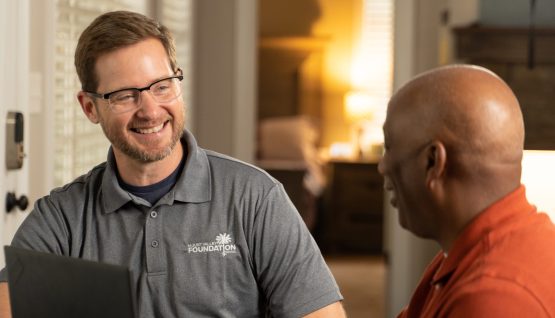
FAQs
About Waterproofing, Crawl Spaces & Foundation Repair in Greenville
Drywall can give your Greenville basement a clean, finished look, but unless you have waterproofing measures in place, you’re probably going to have problems. Mold on basement drywall is to be expected given the material that it’s made of. Drywall is made of gypsum plaster sandwiched between two layers of paper. Paper itself is an organic material, which is something mold needs to survive. Moisture is something else mold needs, and, in a poorly waterproofed basement, there’s no shortage of it.
When you have a moldy drywall, your first instinct might be to remove it yourself, but consider hiring professionals instead. Mold is persistent, so if you miss a single spot, you’ll see mold on your wall just a few weeks later. Professionals who are experienced in mold removal know just how much disinfectant to use without damaging the drywall. When removing mold, the drying process is another important part, because any humidity that overstays its welcome in your basement will foster even more mold.
After the mold has been removed, you need to consider waterproofing your basement. There are certain kinds of mold that need very little moisture to survive, so you’ll need to keep your basement as dry as possible if you want to avoid the problem in the future. If you have drywall in there, then it most likely means you care about how that part of your home looks. Remember that the basement’s structural integrity is also important, and mold growth on drywall is a threat to that structure.
Even if you think that your Greenville home’s settled slab is out of the way enough to not hurt anybody, you still need to think about repairs. An uneven slab won’t stay intact forever, and as the settling advances, there’s a higher chance of cracks and breakage. If your slabs are completely intact, then you definitely don’t want to get to the point where they are broken. A broken slab is a lot harder to repair than a whole one, so you might have to spend more money on replacing instead of repairing. There is a way to avoid breaking your settling slab, but to do this, you need to make some changes depending on the location of the slab.
The first thing you should do is contact an expert for concrete lifting repairs. While you wait, you need to make sure that the slab gets used as little as possible. Concrete handles pressure poorly when it lacks an uneven base, which is why it cracks when used. Depending on the location of the slab, leaving it alone can be either easy or difficult. Settled slabs on driveways mean that you will have to park your car elsewhere or in a different way than you usually would. During the winter, keep snow from piling up on the slab, not only because of the freeze-thaw cycle but also because of the weight.
Sometimes, however, no matter how well you take care of a slab, it will break. Some concrete slabs are simply made with a low psi, which affects the strength of the concrete and how much it can handle. While it is true that concrete slabs made for residential properties tend to have a lower psi, this isn’t always deliberate. A simple mistake or the wrong measurement of an ingredient can lead to weak concrete, and even experts get it wrong sometimes. Because it can be hard to tell how strong your concrete is, it’s better to be safe than sorry, and call for slab repairs as fast as possible.
Mudjacking is a long-established form of concrete lifting that involves pumping in a slurry of cement underneath the settling structure. SettleStop PolyRenewal™, on the other hand, utilizes polyurethane foam to lift the slab. SettleStop PolyRenewal™ is considered to be the superior repair method by many in the industry for multiple reasons. While mudjacking does get the job done, there are multiple consequences that come with using cement. SettleStop PolyRenewal™ takes everything mudjacking does right and does it better without any of the negative side effects.
Part of the reason why SettleStop PolyRenewal™ is so great is due to the convenience. The holes drilled to inject the polyurethane foam are a lot smaller than the holes used for traditional mudjacking, so contractors are able to work with weaker concrete structures. The device used to inject the foam is also smaller, so the lifting procedure can be done on concrete that is difficult to reach. But convenience for contractors isn’t the only plus: cement takes 24 to 48 hours to cure, so if the job is done on your Greenville home’s driveway, you won’t be able to use it for days. Polyurethane, on the other hand, takes only 15 to 30 minutes to cure, so the entire job can be done a lot faster with SettleStop PolyRenewal™.
The cement used in mudjacking is rough, heavy, and not an ideal material to place on top of soil that is already displaced. It has the potential to cause even more settling simply due to the pressure it exerts on the soil. Polyurethane foam is strong enough to support the slab but extremely lightweight. The disturbance to the soil is minimal, making it a much better material for concrete lifting than cement. For reliable, long-term repairs, contractors recommend SettleStop PolyRenewal™.
The best foundation repair solutions for a settling Greenville home are push piers and helical piers. Foundations settle because the soil that was supposed to support them began to shift, thus becoming unreliable. Foundation piers are then used to stabilize the home and provide a support system that doesn’t rely on a volatile material like surface soil. There is one thing that many get wrong about foundation piers, and it’s that the house is supported by the piers alone. However, the piers transfer the majority of the home’s weight to the load-bearing soils deep underground that do not erode as easily as topsoil.
The main difference between helical piers and push piers is the way they function to stabilize the house. Helical piers are steel rods with helix blades welded to one of the ends. The helix blades help the rods get mechanically driven into the soil until reaching the needed depth. Helical piers have trouble going through sedimentary rock, so it might not be the best pier type for you if the terrain on your property is on the rougher side. Helical piers can support a tremendous amount of weight, but if your home is too heavy, push piers will be needed.
Push piers are typically used for larger buildings because they rely on a counterweight to stay underground. They do not have helix blades, and, instead of being drilled into the ground, they are hydraulically pushed in—hence the name. Push piers exert an incredible amount of pressure on the foundation, stabilizing it and even lifting it up on occasion. The house needs to return that pressure right back so that everything stays even. Push piers do better on tougher soils and are able to push through sedimentary rock better than helical piers.
The freeze-thaw effect describes the cycle water goes through as it turns into ice and then melts back into its liquid form. The freeze-thaw effect is part of the reason why it’s so important to protect your concrete from moisture exposure if you want to prevent structural damage. When water turns into ice, it expands by about 9%. It may not seem like it, but expanding ice is fully capable of displacing concrete particles. Every time there’s some sort of displacement, the concrete becomes structurally weaker with time.
The freeze-thaw cycle is capable of creating small craters both inside and along the surface of the concrete. Concrete is already impermeable, but with each new micro-tear, it allows moisture to seep through even more. As more and more water gets past the structure, the freeze-thaw cycle also displaces the soil underneath. Concrete settling advances, and then you have an uneven, structurally weak slab. The more porous concrete is, the worse its tensile strength is, so cracking is inevitable on a slab that has been exposed to moisture during the winter.
How dangerous exposure to the freeze-thaw cycle is depends on the severity of the winter climate. Although Greenville, SC, isn’t exactly a winter wonderland, there are enough nights out of the year where the temperature reaches at or below freezing for it to have an effect. Freeze-thaw is a lot more impactful on concrete with low psi, which is typically the case for slabs made for walkways, since they aren’t considered to be “heavy duty” slabs. Keeping the snow off of your concrete is an integral part of slab protection, so consider covering your concrete during the winter. This way, if your slab does settle, you can avoid having to replace it due to breakage that prevents repairs.
The most common solutions used in certain situations aren’t always the most efficient ones. Such is the case with waterproof paints, which are inexpensive and easy to acquire. They are popular with DIYers because they are easy to use in basements and guarantee impermeability. However, waterproof paints are not reliable enough to be used in basements, and you would be much better off if you used actual waterproofing solutions. At a glance, professional solutions seem more expensive, but when you factor in the damage that can occur from poor waterproofing, the money spent is a drop in a bucket.
Waterproof paints are not long-term solutions. They only last up to two years on a wall before chipping and flaking off. This means that you’ll have to repaint your Greenville basement walls every few years, which is not ideal since most waterproof paints require the surface to be completely clean of any dust, mold and paint before application, so repainting is not a viable option. The more you repaint a wall with waterproof paint, the less effective the paint itself is, so your basement will still be humid after all your hard work. Instead, consider a vapor barrier like AquaStop WallSeal™ that is able to stop water vapor from permeating through the concrete without ever flaking off.
AquaStop WallSeal™ is made of 12-mil polyethylene, so it’s much thicker and, therefore, more efficient than waterproof paints. It’s also coated with antimicrobial additives that keep it clear of mold. Waterproof paints have a lot of ingredients in them that can be eaten up by mold, so there’s always a risk of fungal growth on your walls if you use waterproof paints. AquaStop WallSeal™ is mechanically applied to the walls of the basement, so there’s no chance of it ever coming off. It’s anti-tear and engineered better than paint to deal with water vapor, so it’s the superior option for basement waterproofing.
Find Your Service Area
Greenville, SC
Search results for No results found for
Anderson, SC
Mount Valley Foundation Service serves South Carolina, providing proven basement waterproofing, crawl space encapsulation, foundation repair, and concrete lifting services.
Clemson, SC
Mount Valley Foundation Service serves South Carolina, providing proven basement waterproofing, crawl space encapsulation, foundation repair, and concrete lifting services.
Easley, SC
Mount Valley Foundation Service serves South Carolina, providing proven basement waterproofing, crawl space encapsulation, foundation repair, and concrete lifting services.
Fort Mill, SC
Mount Valley Foundation Service serves South Carolina, providing proven basement waterproofing, crawl space encapsulation, foundation repair, and concrete lifting services.
Fountain Inn, SC
Mount Valley Foundation Service serves South Carolina, providing proven basement waterproofing, crawl space encapsulation, foundation repair, and concrete lifting services.
Gaffney, SC
Mount Valley Foundation Service serves South Carolina, providing proven basement waterproofing, crawl space encapsulation, foundation repair, and concrete lifting services.
Greenwood, SC
Mount Valley Foundation Service serves South Carolina, providing proven basement waterproofing, crawl space encapsulation, foundation repair, and concrete lifting services.
Greer, SC
Mount Valley Foundation Service serves South Carolina, providing proven basement waterproofing, crawl space encapsulation, foundation repair, and concrete lifting services.
Mauldin, SC
Mount Valley Foundation Service serves South Carolina, providing proven basement waterproofing, crawl space encapsulation, foundation repair, and concrete lifting services.
Greenville Local Office
Contact UsMount Valley Foundation Services
300 South Ave
Spartanburg, SC 29306
Hours of Operation
Monday – Thursday: 7 am – 9 pm
Friday: 7 am – 7 pm
Saturday: 8 am – 2 pm

